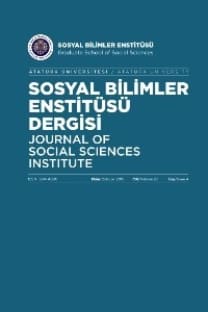Avusturyalı Robinson Osmanlı İmparatorluğunda
18. yüzyılda Almanca konuşulan bölgelerde bir dizi Robinsonad yayınlanmaya başlanır.
Bunlar genellikle Daniel Defoe’nin 1719 yılında yayınlanan İngilizce orijinalinden farklılıklar
gösterir. Orijinal Robinson’da ağırlıklı olarak ekzotik ada hayatı ve buradaki yaşam mücadelesi
konu edilirken, sonrasında yayınlanan ve taklit niteliği taşıyan Robinsonadlarda genel itibariyle
Türklerle ilgili sahnelere de yer verildiği dikkat çekmektedir, tıpkı 1802 yılında yayınlanan Johann
Georg Peyer adlı Yukarı Avusturyalı Robinson’un hikayesi gibi. 1739 yılında Türklere esir düşen
Peyer uzun bir zaman Osmanlı İmparatorluğunda yaşamak zorunda kalır, Fatime adlı bir Türk
kızına aşık olur ve onunla beraber Osmanlı Imparatorluğundan kaçmaya çalışır. Uzun maceraların
ardından sözde ıssız bir adaya düşerler.
Çalışmanın amacı Avrupalıların yabancıya, özellikle de eserde önemli yer tutan Türklere ve
Osmanlı İmparatorluğuna, bakışını ortaya koymaktır. Bunun için öncelikle metin türü olarak (hayali)
seyahatnameler, özellikle de Robinsonadlar tanıtılacaktır. Ardından incelenen Robinsonad
üzerinden tarihi olayların bu metin türüne etkisi irdelenecektir. Adadaki yaşam ve yabanilere bakış
ortaya konduktan sonra, her iki “yabancı” kültürün eserde nasıl betimlendiği ve “ötekinin” ne
zaman ve hangi kriterler doğrultusunda kabul gördüğü irdelenecektir.
Anahtar Kelimeler:
Robinsonad, seyahatme, öteki kavramı, Osmanlı İmparatorluğu, ada
In the 18th century, a number of Robinsonads started to be published in the Germanspeaking lands. These versions demonstrate differences from the English original, namely Daniel Defoe’s Robinson Crusoe, which was published in 1719. The Robinsonads, which were published later and were essentially the imitations of the English original, also include scenes about Turks, whereas the plot of Defoe’s original version is based on the exotic life on a deserted island and the struggles it necessitates. A case in point is the 1802 publication of the story of Johann Georg Peyer, an Austrian Robinson. Peyer, taken prisoner by Turks in 1739 and forced to live in the Ottoman Empire for a long time falls in love with a Turkish girl Fatime and decides to flee the Ottoman Empire with her. After a series of long adventures, they become stranded on a deserted island.The aim of this study is to analyze the European perception of foreigners, particularly, of Turks and the Ottoman Empire, which constitute a significant aspect of the literary work in question. In doing so, the text type of fictional travel books of which Robinsonads are specific examples is discussed in the first section. In the next section, the influence of historical events on fictional travel books is dwelt upon, on the basis of the Robinsonad analyzed in this study. The encounter of different cultures as well as the comparison thereof constitutes one of the main characteristics of Robinsonads. Thus, the implications for and the significance of such encounters and comparisons in the work are also discussed. In the final section, the question of how the two “foreign” cultures are described and when and in line with which criteria “the Other” becomes accepted by the host culture will be elaborated upon following a presentation of the life on the deserted island
Keywords:
Robinsonad, travel books, the notion of “the Other”, the Ottoman Empire, island,
- ISSN: 1304-4990
- Yayın Aralığı: Yılda 4 Sayı
- Yayıncı: Atatürk Üniversitesi Sosyal Bilimler Enstitüsü Müdürlüğü
Sayıdaki Diğer Makaleler
Balkanlar'dan gelen müslüman göçmenlerin malları sorununa genel bir bakış (1913-1918)
Karabük Üniversitesi’ndeki Türk EFL Öğrencilerin Kelime Öğrenme Stratejileri
Saliha KODAY, Gökhan BAKİ, Gökhan BAKİ
Avusturyalı Robinson Osmanlı İmparatorluğunda
A review of research on the effects of second life on speaking anxiety
İnanç Öğrenme Alanları Açısından Lise Din Kültürü ve Ahlak Bilgisi Ders Kitaplarının İncelenmesi
Celil AYDIN, Fatma ODABAŞIOĞLU GÜNDOĞDU
